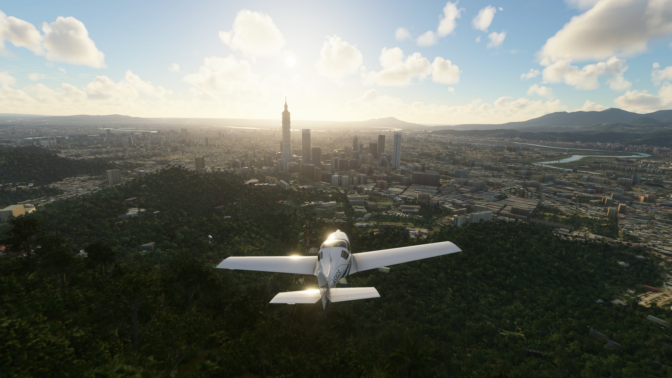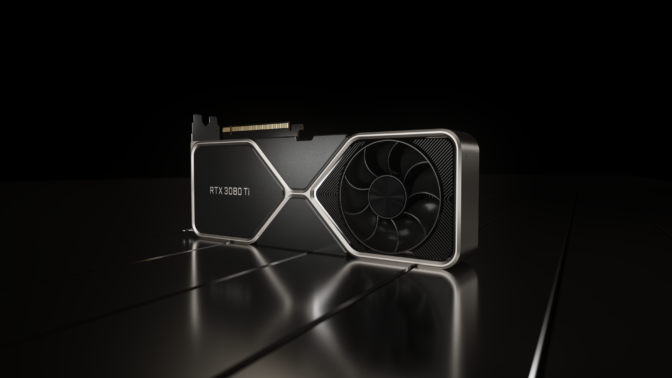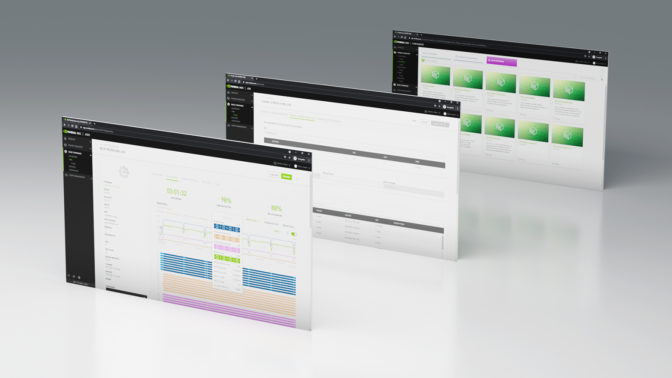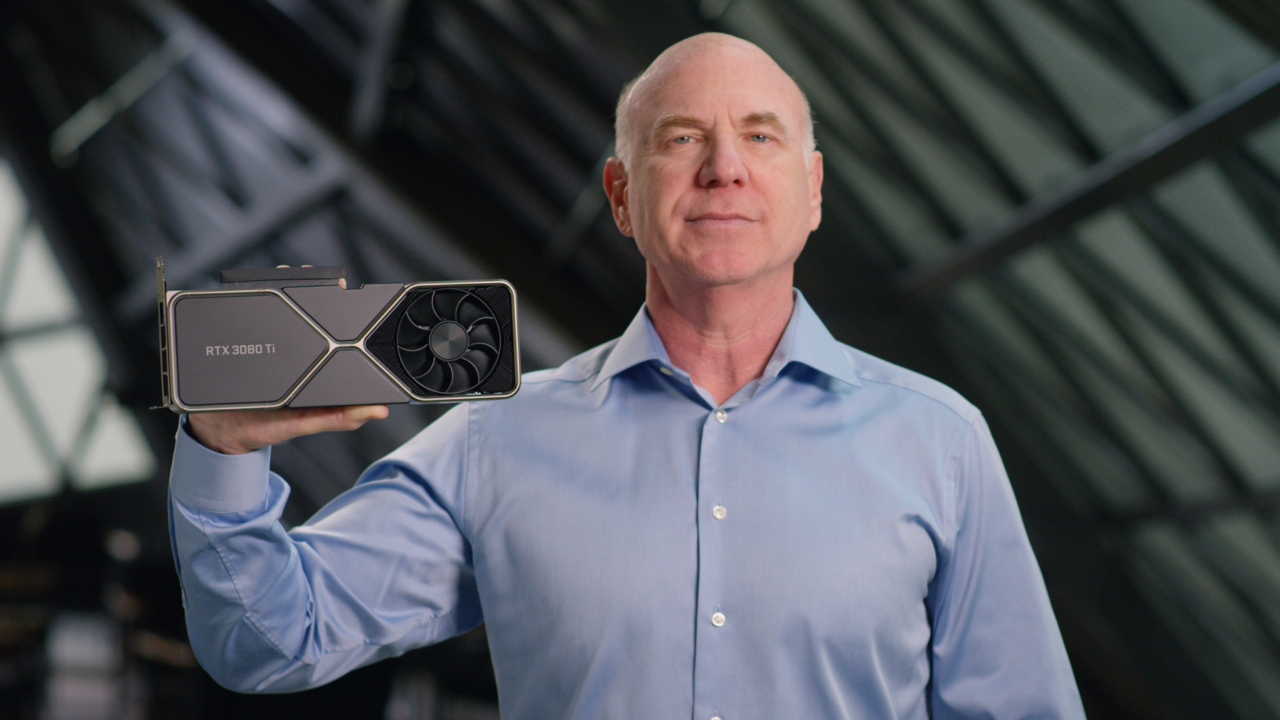Touching on gaming, enterprise AI — and the advances underpinning both — NVIDIA’s Jeff Fisher and Manuvir Das Tuesday delivered a news-packed virtual keynote at COMPUTEX 2021.
Fisher, senior vice president of NVIDIA’s GeForce business, announced a pair of powerful new gaming GPUs — the GeForce RTX 3080 Ti and GeForce 3070 Ti. He spoke about NVIDIA’s role in powerful new laptops for gamers and creators. And he detailed the fast-growing adoption of NVIDIA RTX technologies in a growing roster of games.
Das, head of enterprise computing, announced that dozens of new servers are certified to run NVIDIA AI Enterprise software, marking a rapid expansion of the NVIDIA-Certified Systems program, which has grown to include more than 50 systems from the world’s leading manufacturers.
The joint keynote began with a flourish, with Fisher announcing a unique Microsoft Flight Simulator mod paying tribute to Taipei. “We miss Taipei and wish we could be there in person for COMPUTEX,” Fisher said. “So we created Taipei City in Microsoft Flight Sim and flew in virtually on a GeForce RTX 3080.”

New Gaming Flagship, New Laptops, RTX Momentum
Fisher began the talk by touching on how gaming has transformed entertainment. NVIDIA RTX technologies are changing everything, not just for gamers, but for 150 million creators, broadcasters and students, Fisher explained.
With over 130 of the top games and creative apps accelerated by NVIDIA GPUs, RTX is the new standard, he said, with NVIDIA DLSS, Reflex and ray tracing boosting image quality and performance on a long list of game franchises. Fisher also announced several new RTX games, including DOOM Eternal, Red Dead Redemption 2, Rainbow Six Siege, Icarus and DYING: 1983.
RTX accelerates the No. 1 photography app, the No. 1 video editing app and the No. 1 broadcast app. For gamers, RTX is powering the No. 1 battle royale, the No. 1 RPG and the No. 1 best-selling game of all time. Soon 12 of the top 15 competitive shooters will feature NVIDIA Reflex, with the addition of Escape from Tarkov, CrossFire HD and War Thunder, Fisher said.
And GeForce laptops are the fastest-growing gaming platform for such experiences. It’s a platform now fueled top to bottom by RTX, third-generation Max-Q technologies and the magic of DLSS, which uses AI-powered Tensor Cores to boost frame rates.
This year brought a record launch for RTX laptops, with over 140 models from every manufacturer. Starting at $799 and featuring Max-Q, a collection of NVIDIA technologies for making gaming laptops thinner, lighter and more powerful, “there is now an RTX laptop for every gamer,” Fisher said.
Highlighting an example of that work, Fisher announced the Alienware x15, an ultra-thin, GeForce RTX 3080 laptop. Powered by Max-Q technologies including Dynamic Boost 2.0, WhisperMode 2.0 and Advanced Optimus, and featuring a 1440p display, “it is the world’s most powerful sub-16mm 15-inch gaming laptop,” Fisher said.
For 3D designers, video editors and photographers, NVIDIA developed NVIDIA Studio. These are specially configured systems, optimized and tested for creator workflows, and supported with a monthly cadence of Studio Drivers, Fisher said.
Fisher announced a pair of new Studio laptops from HP and Acer. The 14-inch HP Envy brings the capabilities of RTX to an ultra-portable laptop that’s “great for students and creators on the go,” Fisher said. The new Acer ConceptD offers a variety of traditional clamshell options and an Ezel sketch board design to give creators even more flexibility, Fisher said.

Based on the NVIDIA Ampere architecture, with second-generation RT Cores and third-generation Tensor Cores, Ampere is “our greatest generational leap ever,” Fisher said. “The 80 Ti class of GPUs represents the best of our gaming lineup.”
The GPU comes as the production value of games continues to march forward, Fisher explained. “New titles like Cyberpunk 2077 and Watch Dogs: Legion have elevated realism, demanding even more of the GPU,” he said.
Fisher said the RTX 3080 Ti is 1.5x faster than its predecessor and tears through the latest games with all the settings cranked up. And the RTX 3070 Ti is 1.5x faster than a 2070 SUPER, thanks to more cores and superfast GDDR6X memory.
GeForce RTX 3080 Ti availability will begin on June 3, starting at $1,199. GeForce RTX 3070 Ti availability begins on June 10, starting at $599.
“Every person born today is a gamer,” Fisher said. “We have an amazing future ahead, and we look forward to building it with all of you.”
‘AI for Every Company’
Following Fisher, Das spoke in detail about the three essential ingredients built by NVIDIA: the hardware foundation from which to make any system, the software platform for artificial intelligence and the software platform for collaborative design.
“It is time to democratize AI by bringing its transformative power to every company and its customers,” Das said.
To help system manufacturers create AI-optimized designs and to ensure that the systems can be relied on by customers, NVIDIA made NVIDIA-Certified, a program for servers that incorporate GPU acceleration, Das explained.

Das announced dozens of new servers certified to run NVIDIA AI Enterprise software.
Coming from Advantech, Altos, ASRock Rack, ASUS, Dell Technologies, GIGABYTE, Hewlett Packard Enterprise, Lenovo, QCT, Supermicro and others, the growing roster of NVIDIA-Certified Systems include some of the highest-volume x86 servers used in mainstream data centers. They bring the power of AI to a wide range of industries including healthcare, manufacturing, retail and financial services.
Das announced that NVIDIA will expand its NVIDIA-Certified systems program to systems with NVIDIA BlueField DPUs. Several of the world’s top server manufacturers — including ASUS, Dell Technologies, GIGABYTE, QCT and Supermicro — today at COMPUTEX 2021 announced new systems powered by NVIDIA BlueField-2 data processing units.
“Going forward, the DPU will be an essential component of every server, in the data center and at the edge,” Das said.
Das also announced the NVIDIA-Certified System program will expand to support accelerated systems with Arm-based host CPUs. In addition, along with NVIDIA partner GIGABYTE, Das announced a devkit can be used by application developers to prepare their GPU-accelerated apps for Arm.
“As the GPU and DPU accelerators take on more of the compute workload for AI, it becomes useful to view the host CPU as an orchestrator, more so than as the compute engine,” Das said.

Building on NVIDIA’s work to enable powerful GPU instances in the cloud, Das announced that Google Cloud is among the first cloud service providers planning to enable NVIDIA’s powerful Base Command Platform for the management and orchestration of clusters in their cloud instances.
The software is designed for large-scale, multi-user and multi-team AI development workflows hosted either on premises or in the cloud. It enables numerous researchers and data scientists to simultaneously work on accelerated computing resources, helping enterprises maximize the productivity of both their expert developers and their valuable AI infrastructure.
Das announced that Cloudera, a provider of Apache Spark to enterprise data centers around the world, will add transparent GPU acceleration using NVIDIA RAPIDS, a set of libraries that accelerate machine learning on GPUs. A fully integrated solution from Cloudera will be available starting this summer, with the release of CDP version 7.1.7, Das said.
Das also announced that NVIDIA will partner with leading global systems providers to offer NVIDIA Omniverse Enterprise, making it easy for teams to collaboratively design and simulate in 3D at $14,000 per year per company.
“Companies around the world and across industries are already using Omniverse to collaborate in amazing ways,” Das said.
And in security, Das announced that NVIDIA is working with Red Hat to provide Morpheus developer kits for both OpenShift and Red Hat Enterprise Linux, or RHEL, the most commonly used version of commercial Linux in enterprise data centers today.
Morpheus, introduced at NVIDIA’s GTC conference earlier this year, uses machine learning to identify, capture and take action on threats and anomalies.
“Cybersecurity companies will now be able to use Morpheus on RHEL and OpenShift to bring advanced security to every enterprise data center,” Das said.
‘Thank You’
Das closed his COMPUTEX talk — which touched on the work of so many partners — on a note of gratitude to NVIDIA’s customers and partners throughout the industry.
“On behalf of my co-presenter Jeff Fisher, our CEO Jensen Huang and all of NVIDIA, thank you,” Das said. “Thank you for joining us today; thank you for being with us every step of the way; and thank you for continuing forward with us on this amazing journey.”
NVIDIA will hold three additional talks during the COMPUTEX forums.
Featured image credit: 毛貓大少爺, Some rights reserved.
